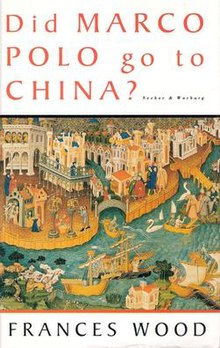Did Marco Polo go to China?

First UK hardcover edition, 1995
|
|
| Author | Frances Wood |
|---|---|
| Country | United States |
| Language | English |
| Subject | History |
| Published | 1995 |
| Media type | |
| ISBN | |
Did Marco Polo Go to China? is a 1995 book, by Frances Wood, arguing that Venetian explorer Marco Polo never visited China but travelled no further than Persia and that he based his description of China on accounts from Persian travelers.
The book notes that Polo failed to mention the Great Wall, the use of chopsticks as eating utensils, tea, foot-binding, Chinese calligraphy or other significant features and that there are no Chinese records of Polo's presence. Thus it is a typical example of an argument from silence.
Some archeologists have pointed to inconsistencies and inaccuracies in his description of Kublai Khan's attempted invasions of Japan in 1274 and 1281 and that Polo's account mixed up details from the two invasions.
A number of scholars have argued in favor of the established view that Polo was in China in response to Wood's book. The book has been criticized by figures including Igor de Rachewiltz (translator and annotator of The Secret History of the Mongols) and Morris Rossabi (author of Khubilai Khan: his life and times).
Errors in Wood's book have been pointed out by various scholars. For example, Stephen G. Haw notes how Wood claims that the History of Yuan mentions Giovanni de Marignolli by name even though it mentions only the tributary gift that he brought to the Yuan court, a large impressive war horse given by the "Franks" (Fulang) of Europe.
The historian David Morgan also points out basic errors made such as confusing the Liao dynasty with the Jin dynasty, and he found no compelling evidence in the book that would convince him that Marco Polo did not go to China. Haw also argues in his book Marco Polo's China that Marco's account is much more correct and accurate than has often been supposed and that it is extremely unlikely that he could have obtained all the information in his book from second-hand sources. Haw also criticizes Wood's approach to finding mention of Marco Polo in Chinese texts by contending that contemporaneous Europeans had little regard for using surnames and that a direct Chinese transliteration of the name "Marco" ignores the possibility of him taking on a Chinese or even Mongol name with no bearing or similarity with his Latin name.
...
Wikipedia
